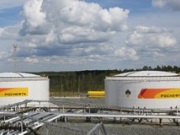Rosneft Chairman of the Management Board Igor Sechin gave a keynote speech at the opening of the Fourth Eurasian Forum "Innovations and International Integration" in Verona (Italy), which is one of the key forums for developing a dialog in the Eurasian space.
Igor Sechin expressed an opinion that it is "Big Eurasia" that historically has been the center of the world civilization, and global economic growth is concentrated in the territory of this macro-continent.
The Chairman of Rosneft Management Board said that despite the negative marco-environment and the pressure of sanctions on Russia, the economy of the country has been stable, and the power sector has demonstrated certain growth: both in terms of hydrocarbon production, and export supplies.
In contrast, European power industry is experiencing difficulties, according to Igor Sechin. «Presently, the European refining margin has grown due to feedstock cost decrease. But, generally, this industry has long been facing hard times». The issue of ensuring economic viability is becoming critical, and in this context, potential expansion of cooperation with Russia is fundamental, Igor Sechin believes. «With long-term contracts for supply of crude of certain quality, refineries will be able to define their strategies for demand-based modernization in a more accurate and efficient way", the Leader of Rosneft said. - The refineries that have stable supplies of crude of the quality which best fits their refining capacities, will get competitive advantages.».
According to Igor Sechin, the energy dialog is one of the most promising mechanisms for building Europe - Russia - Asia inter-civilization bridge . «Eurasia remains the world's largest producer and consumer of oil. 59% of the world's oil reserves (142 bln. t) and 60% of world's refining capacities are located there, the Head of Rosneft noted. World's two largest oil producers - Russia and Saudi Arabia – are also situated in the Eurasian continent. Even though, production in the region does not cover the demand of Eurasia which accounts for 65% of the world's oil consumption. The shortage is about 100 mm t of oil per year. This gap will be increasing to reach 500 mm t by 2030. Thus, oil producers of Eurasia have certain competitive advantage due to their geographic positions in respect to the most receptive oil markets».
Sechin stressed that significant re-distribution of energy consumption in favor of the Asian part of the continent is currently going on. «The share of Europe in global primary energy consumption declined from 34% in 1990 tо 19% in 2015, pointed out the Head of Rosneft». - At the same time the share of Asia increased from 31% tо 50%».
Nevertheless, in the opinion of Igor Sechin, the natural historical synergy of the European and Russian civilizations offers hope for resumption of the full-scale dialog in the near future. In our view, Rosneft alone can offer European partners to participate in the projects for the amount of about $100 bln., the Head of Rosneft said.
«The scale of Rosneft investment program assumes one of the world's largest anchor orders for engineering industry and chemical industry products, in the first place – about 4.6 bln. euro annually, pointed out Igor Sechin. – Аnd Rosneft aggregate demand for materials in 2016-2018 will amount to € 15.9 bln.».
Sechin named the partnership between Rosneft, Pirelli and ChemChina as one of the examples of integral cooperation in Eurasian space, «Italian Pirelli demonstrated a model approach to risk minimization and the use of synergy potential of Eurasian cooperation. What happened is actually a large-scale launch of European tire technologies at the largest APR markets with the use of resource potential of Russia and financial capability of China».
In conclusion Igor Sechin said that «energy as as well as food production, due to their strategic importance for any economy, and for the quality of life of mankind, basically should not be subject to made-up interference, pressure and manipulations of any type. We all should seek to ensure that flows of energy resources and respective flows of capital and technologies do not become bargaining chips».
31 Декабря 2025 | среда | 06:10


